How to Use Chinese Social Media to Find the Chinese Factory
Discover how to use Chinese social media apps like WeChat, Weibo, and Xiaohongshu to find reliable Chinese factories and suppliers.
Contact Us now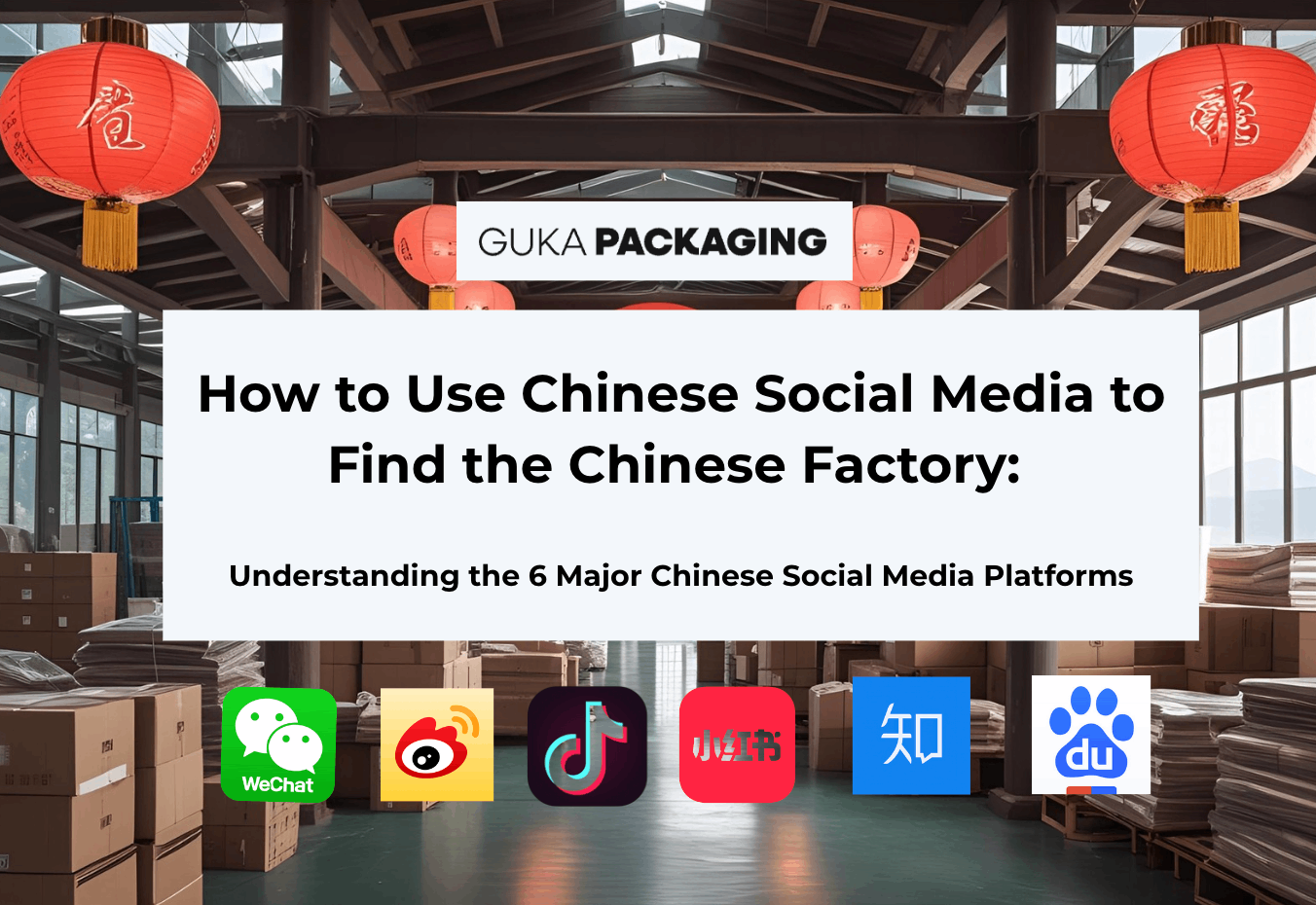
Table of content

Ready to Elevate Your Brand with 100% Custom Box & Bag Solutions?
Get a Free QuoteChina remains the world’s manufacturing powerhouse, producing everything from electronics and apparel to luxury packaging. But for businesses in the U.S., Europe, and Australia, the challenge isn’t just finding a Chinese factory—it’s finding a reliable one. While many companies rely on platforms like Alibaba or Made-in-China, a growing number of savvy importers are turning to Chinese social media for deeper insights, better vetting, and direct communication with manufacturers.
In this guide, we’ll explore how businesses can leverage Chinese social media platforms to identify trustworthy suppliers, avoid middlemen, and build long-term partnerships—especially for industries like cosmetics, fashion, food, wine, and premium packaging.
Why Chinese Social Media Matters for Sourcing
Unlike the West, where social media is mainly for marketing and consumer engagement, social media apps in China often double as business ecosystems. Factories, suppliers, and wholesalers actively promote themselves on these platforms. Here’s why they matter for sourcing:
- Authenticity: Real-time posts, factory videos, and live streams—including short video content—allow you to dynamically see the factory team, environment, and products, making it easier to verify if a company is a genuine manufacturer.
- Reputation check: Comments, reviews, and discussions help filter out unreliable partners.
- Direct access: Bypass middlemen and talk directly with factory representatives.
- Speed: Chinese suppliers are highly responsive on apps like WeChat, making communication much faster than email.
What Social Media Do Chinese Use Most for Business?
Here are the 6 most popular Chinese social media platforms you can use to find and verify manufacturers:
1. WeChat (China’s “Super App”)
WeChat (微信/WeiXin) is a multi-functional, all-in-one app in China. Its main features include messaging, business pages, mini-programs, and mobile payments. Recently, more foreign businesspeople are using WeChat Channels to explore nearby factories through short video content—often discovering suppliers before arranging an in-person visit. Many Chinese factories showcase their company profiles, product catalogs, and certifications on these channels. You can also join WeChat groups focused on packaging, manufacturing, or industry-specific sourcing.
Pro tip: Use WeChat’s video call feature to request a quick virtual tour of a factory before visiting in person.
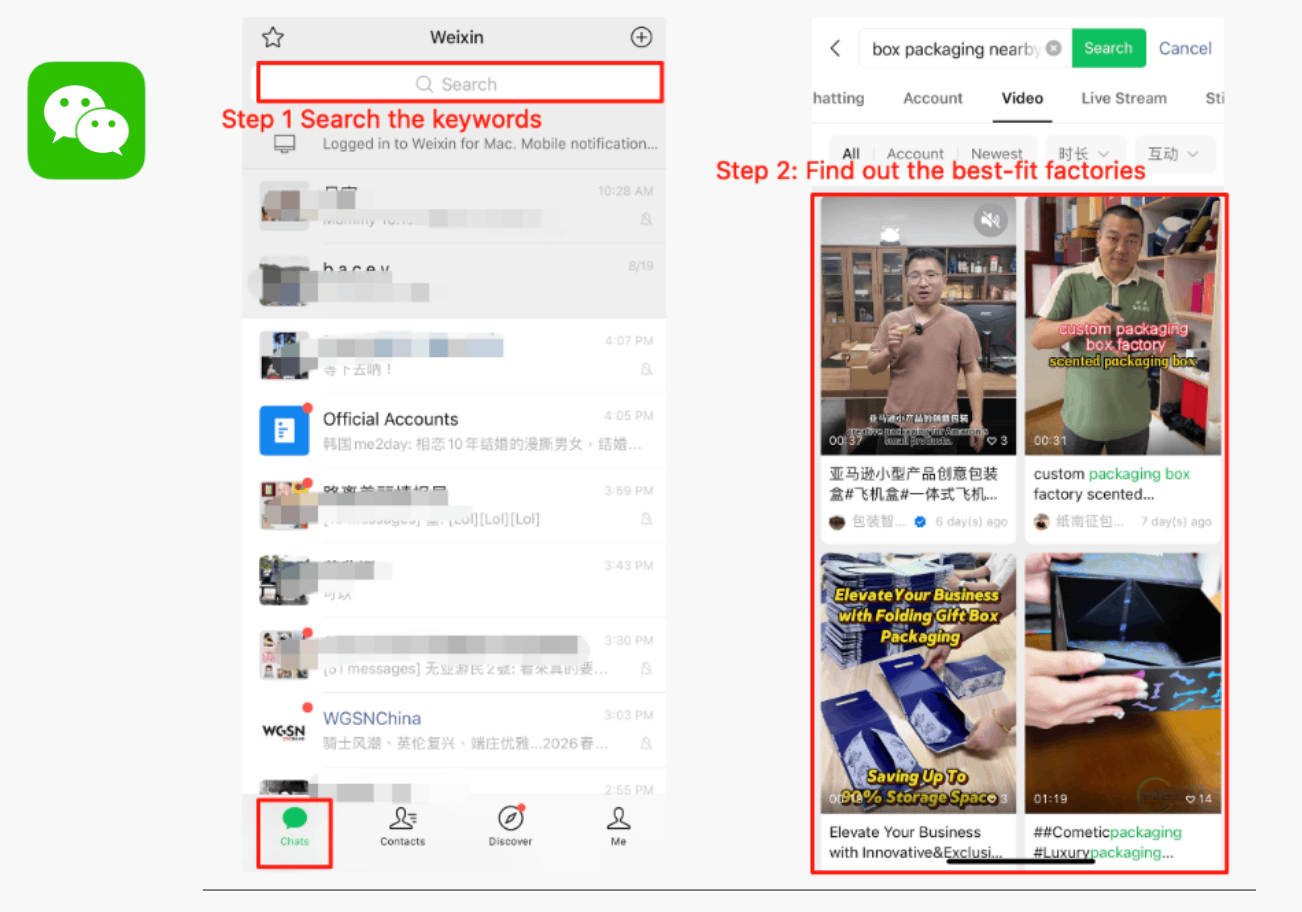
2. Weibo (China’s Twitter-like platform)
Weibo/微博’s functions mainly are Microblogging, company news, and brand monitoring. Many factories use Weibo to share company updates, certifications, and new product launches. You can also browse customer comments and reviews to gauge a supplier’s credibility and online reputation.
How to find factories on Weibo:
- Follow industry topics: Weibo hosts numerous topics and “super-topics” for industries like clothing, electronics, and packaging, where factories post job openings, product updates, or business news.
- Search for relevant accounts: Many factories maintain official Weibo accounts. Search by relevant keywords to find and follow them for updates, product catalogs, and industry insights.
- Join industry communities: Weibo groups and communities provide additional resources and networking opportunities with manufacturers and suppliers.
- Check user shares: Individual users often share factory-related information, including partnerships, job postings, and product news. Searching relevant keywords in user posts can surface valuable leads.
Pro tip: Always verify authenticity by checking account verification status, user reviews, and official factory information before reaching out.
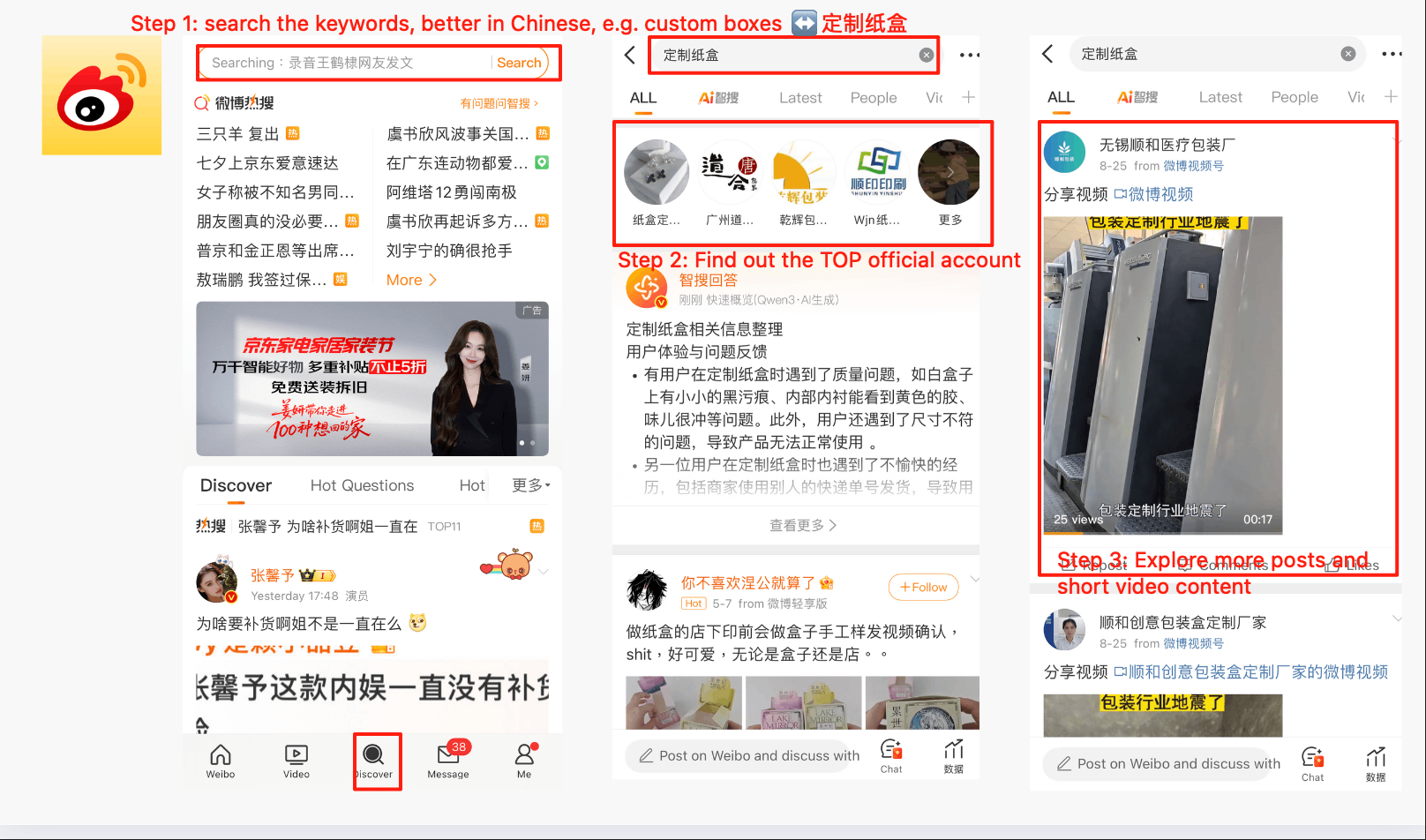
3. Douyin (Chinese TikTok)
Functions: Short videos, live streaming, and advertising. Many factories post videos of their production lines, giving buyers a real look at operations and capabilities. Packaging factories, for example, often showcase box-making processes, materials, and custom designs.
How to find factories on Douyin:
- Search keywords: Use terms like "factory" or industry-specific keywords (e.g.,“box factory,” "garment factory," "toy factory") to find relevant videos.
- Check authenticity: Look for real production scenes—workshops, machinery, and workers in action. Avoid accounts showing only finished products or staged photos.
- Interact directly: Message factories with questions about minimum orders and production timelines. Genuine factories respond quickly and professionally.
- Cross-check info: Confirm factory credibility on platforms like 1688 or Alibaba, and check social media groups or industry exhibitions for additional verification. Pay attention to the "factory/工厂" label and user comments to avoid misleading accounts.
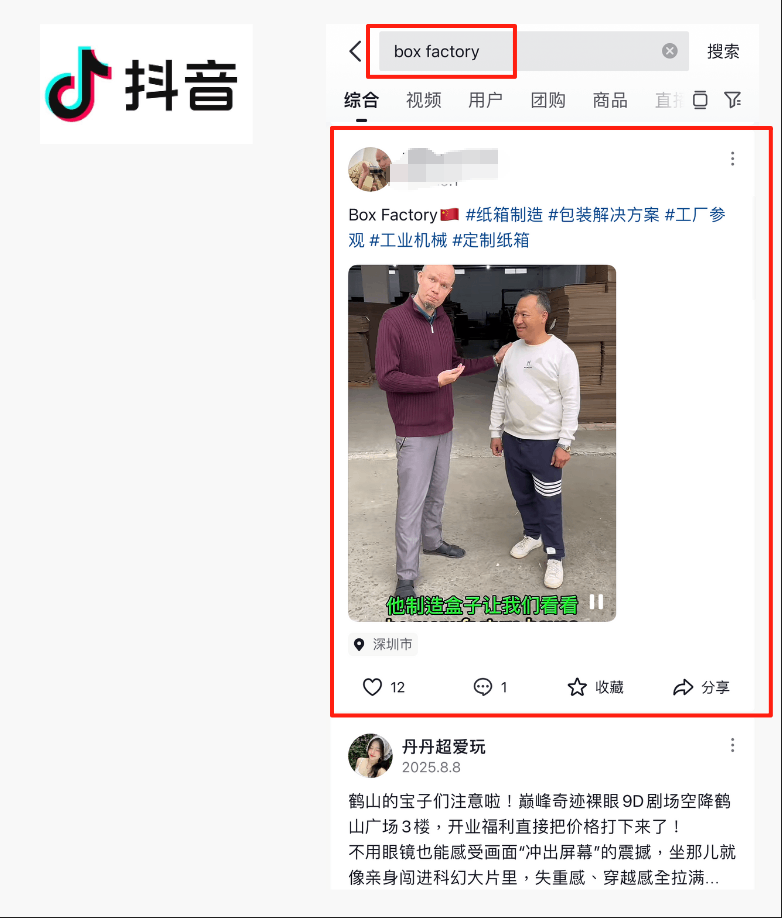
4. Xiaohongshu (RED / Little Red Book)
Xiaohongshu/小红书/RED provides wide of Lifestyle reviews, community discussions, e-commerce. At the beginning of 2025, following the TikTok refugee incident, many foreign users—about 80% of them from the U.S.—joined Xiaohongshu, boosting Sino-foreign interactions on the platform. While mainly consumer-facing, it’s a goldmine for reviews. Many businesses share experiences with manufacturers here, helping you filter trusted suppliers.
How to find factories on Xiaohongshu:
- Keyword search: Enter terms like "industrial belt" or industry-specific keywords to discover local suppliers.
- Screen posts: Look for workshop videos showing workers, equipment, and large production runs—not just samples. Check for clearly stated minimum order quantities.
- Contact directly: Message the factory, highlighting your needs and interest in cooperation to get a higher response rate.
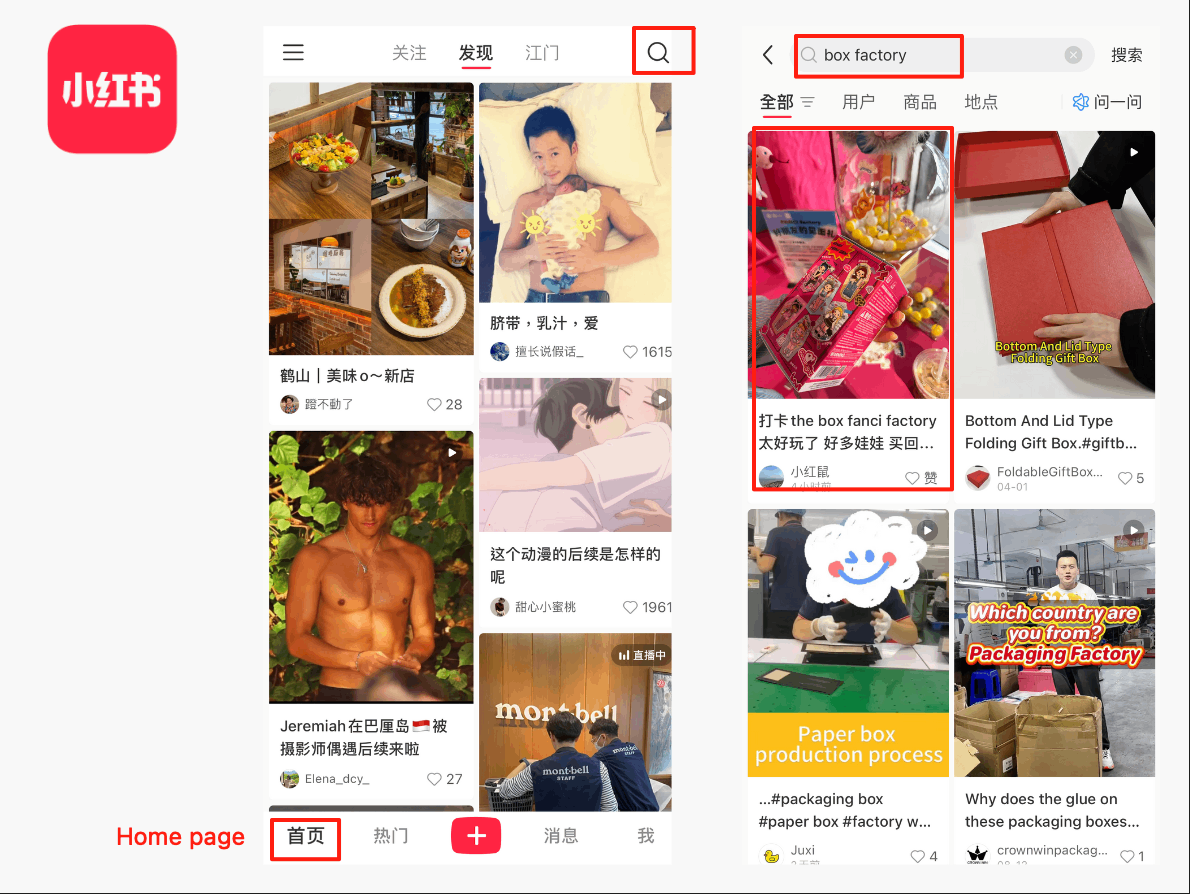
5. Zhihu & Baidu Tieba (Knowledge & Forums)
- Functions: Q&A, discussion forums.
- Why it’s useful: Search for discussions about specific factories or industries. You’ll find real user feedback, including complaints and recommendations.
How to Use Chinese Social Media Apps to Vet Suppliers
Here’s a step-by-step process for sourcing via Chinese social media:
- Search in Mandarin: Use industry-specific keywords (e.g., rigid boxes = 硬盒包装, folding cartons = 折叠盒).
- Check official accounts: Verify if the factory has a complete profile, business license, or ISO certification posted.
- Engage directly: Message suppliers via WeChat or comment on Weibo posts. Genuine factories reply quickly.
- Watch video proof: On Douyin or Xiaohongshu, look for behind-the-scenes factory footage instead of polished ads.
- Join industry groups: Many sourcing groups on WeChat/Weibo/Xiaohongshu/Douyin provide insider tips and direct factory contacts.
- Cross-check externally: Verify what you see on social media with platforms like Alibaba, Made-in-China, or through a sourcing agent.
Red Flags to Watch Out For
Not every supplier on social media is legitimate. Be cautious if:
- The company avoids video calls or on-site factory tours.
- Their posts are overly polished and don’t show real production lines.
- Videos are low-quality, blurry, or clearly edited/reused from other sources—this is often a sign of scams.
- They lack reviews, comments, or genuine customer interactions.
- They push aggressive payment terms without providing references.
Why Packaging Quality Is Crucial
Even after finding the right Chinese factory, packaging can make or break your brand in global markets. A great product in poor packaging won’t impress consumers in the U.S., Europe, or Australia. That’s why GUKA Packaging specializes in:
- Custom rigid boxes for luxury products like perfumes, jewelry, and electronics.
- Folding carton boxes for cosmetics, skincare, and consumer goods.
- Sturdy corrugated boxes for e-commerce and shipping.
- Stylish paper bags for retail, fashion, and gift packaging.
With years of experience supplying international brands, GUKA combines Chinese manufacturing strengths with global quality standards.
Ready to source packaging you can trust? Contact GUKA Packaging today to discuss your next project.
FAQs: Finding Chinese Manufacturers via Social Media
Q1: Can I really find reliable factories on Chinese social media?
Yes! Platforms like WeChat, Weibo, Douyin, and Xiaohongshu are widely used by manufacturers to showcase their production lines, certifications, and product catalogs. Authenticity can be verified through live videos, reviews, and direct communication.
Q2: Do I need to speak Chinese to use these platforms?
While knowing Chinese helps, just translate your language to Chinese directly or hire local sourcing agents. Many factories are accustomed to communicating with foreign clients in English, especially on business-focused channels.
Q3: How do I verify a factory’s legitimacy?
Look for real production videos, verified accounts, reviews, and official documents such as business licenses and production permits. Video calls or virtual factory tours are highly recommended.
Q4: Are all social media leads trustworthy?
Not always. Be cautious of low-quality videos, overly polished content, lack of reviews, or aggressive payment terms without references. Cross-check with other platforms like 1688, Alibaba, or Tianyancha for added security.
Q5: Which platform is best for finding factories?
It depends on your industry. WeChat is versatile for direct communication, Douyin for visual production insights, Weibo for company news, and Xiaohongshu for reviews and community discussions. Using multiple platforms increases your chances of finding reliable suppliers.
Recommended for you











.avif)
.avif)




.avif)
.avif)




.avif)
.avif)








